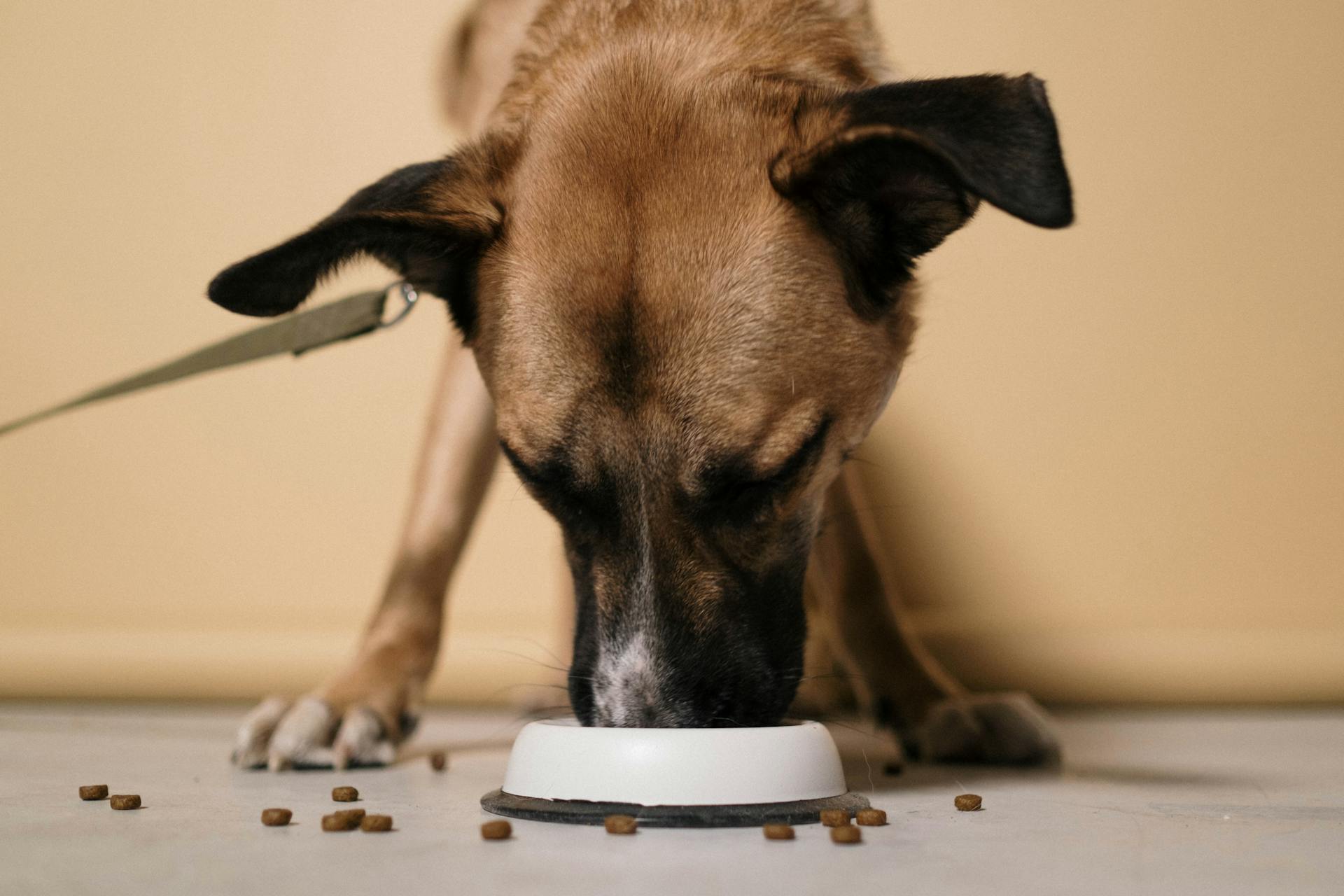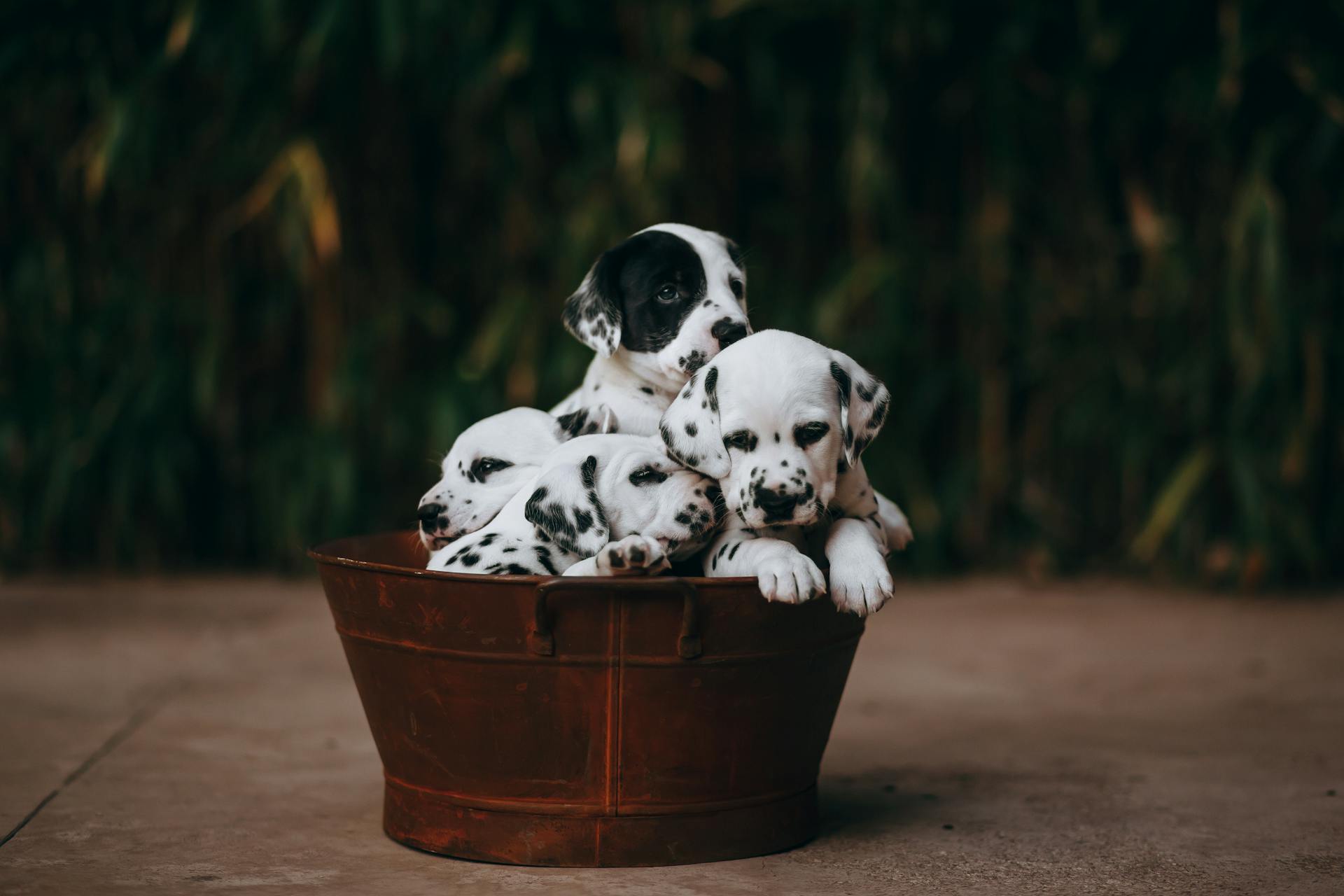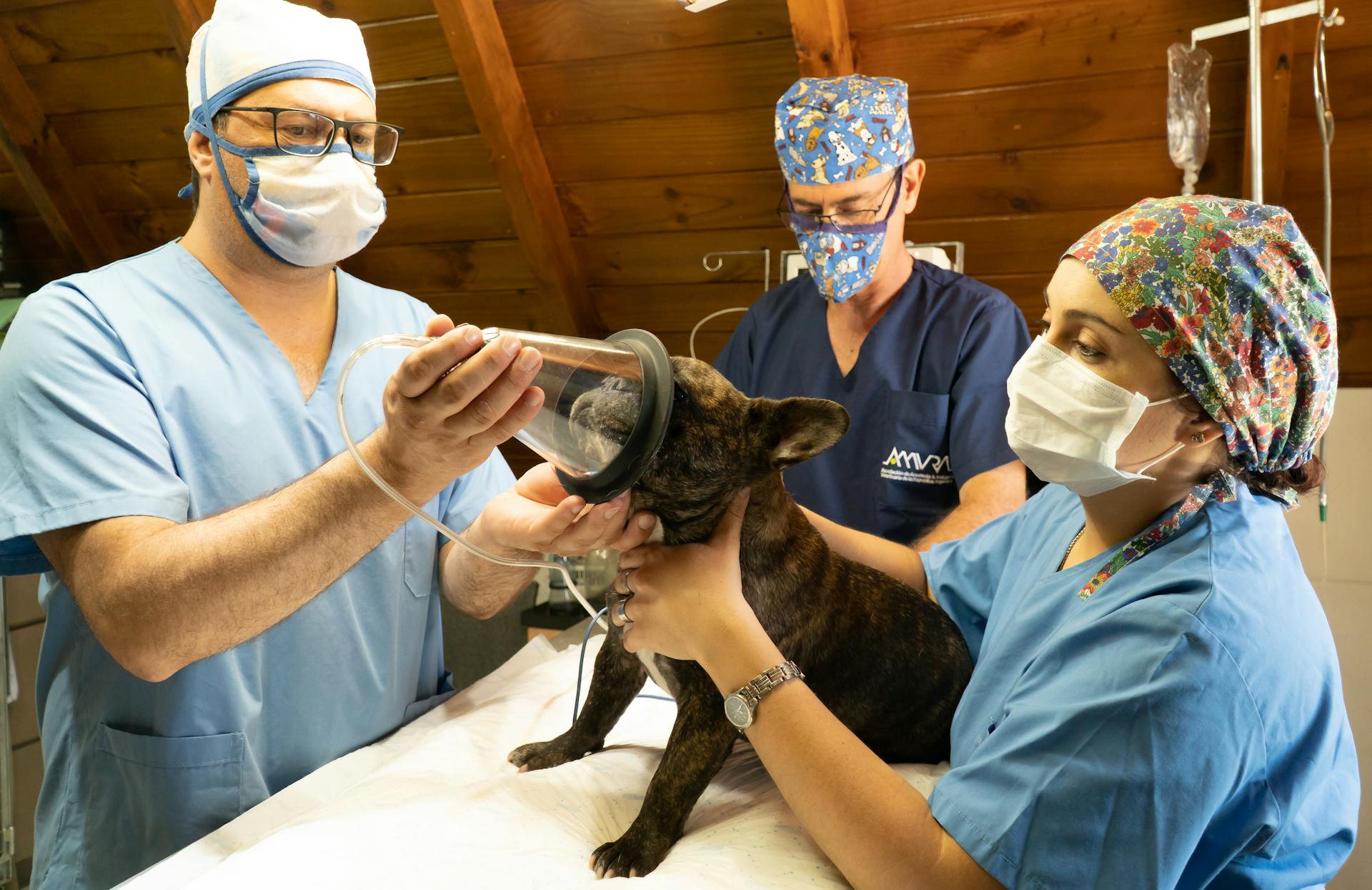
German Shepherds are a popular breed, known for their intelligence and loyalty, but they're also prone to a serious health issue: bloat. Bloat occurs when the stomach fills with gas, causing it to twist and cut off blood flow.
This can happen quickly, often within 30 minutes, and if left untreated, it's fatal in about 50% of cases. German Shepherds are at higher risk due to their deep chest and narrow waist.
To prevent bloat, it's essential to monitor your German Shepherd's eating habits. Eating too quickly or gobbling food can lead to swallowing air, which contributes to bloat.
A common mistake is feeding large meals, which can cause your dog to eat too fast. Instead, divide meals into smaller portions to slow down eating.
Consider reading: Dog Bloat Timeline
Preventing Bloat
Feeding smaller, frequent meals can help prevent bloat by reducing the volume of food ingested at once, minimizing the risk of excessive gas buildup in the stomach.
Regular exercise, without strenuous activity after meals, helps prevent bloat by promoting healthy digestion and reducing the chances of stomach torsion associated with intense physical activity following eating.
Limiting water intake, especially an hour or two before and after meals, prevents bloating by reducing the chances of excessive stomach distension caused by water mixing with food and swallowed air.
Elevated food bowls can increase the risk of bloat, so it's best to use floor-level dog food bowls for German Shepherds.
Stress management is vital in preventing bloat, as high-stress levels can contribute to the condition. A calm environment and reduced stress can help maintain your German Shepherd's digestive health.
Here are some factors that can decrease the risk of bloat:
- Eating two or more meals per day
- Feeding from a bowl on the floor
- Including canned dog food in the diet
- Happy or easy-going temperament
- Maintaining a healthy body weight (not obese or too thin)
- Having access to moderate amounts of water during mealtimes
Risk Factors
Male dogs are more likely to bloat than female dogs, with up to a 50% increased risk.
Large breed, deep-chested dogs like German Shepherds are more prone to bloat than other breeds.
Check this out: Dog Bloat Prevention
Older dogs, specifically those between 7 to 12 years old, are more commonly seen with twisted stomachs than younger dogs.
Eating or drinking large amounts in a short period of time can contribute to bloat in German Shepherds.
Feeding from elevated food dishes may increase the risk of GDV because dogs may swallow more air while eating.
Here are some factors that may increase the risk of bloat:
- Only providing one meal per day
- Using a raised bowl for feeding
- Eating quickly
- Failing to maintain a healthy weight
- Feeding a dry diet that has animal fat listed as one of the first four ingredients
- Limiting water consumption before and after meals
- Having a temperament that is anxious or fearful
- Being male
- Being an older dog (7 to 12 years old)
- Being closely related to another dog with a history of GDV
By understanding these risk factors, you can take steps to reduce the likelihood of bloat in your German Shepherd.
Be Proactive to Prevent
Feeding smaller, more frequent meals can help prevent bloat in German Shepherds. This reduces the volume of food ingested at once and minimizes the risk of excessive gas buildup in the stomach.
Using slow-feeder bowls is another effective way to prevent bloat. These bowls force your German Shepherd to eat more slowly, reducing air swallowing and the likelihood of excessive gas accumulation in the stomach during meals.
Avoiding elevated food bowls can also help prevent bloat. Elevated food bowls can promote a more natural eating posture and reduce the chances of excessive air ingestion during meals.
Limiting water intake, especially an hour or two before and after meals, can also prevent bloat. This reduces the chances of excessive stomach distension caused by water mixing with food and swallowed air.
Regular exercise, without strenuous activity after meals, helps prevent bloat by promoting healthy digestion and reducing the chances of stomach torsion associated with intense physical activity following eating.
Proper diet is also crucial in preventing bloat. Feeding a balanced, high-quality diet with appropriate fiber content can help maintain healthy digestion and reduce the risk of excessive gas buildup.
Stress management is vital in preventing bloat. A calm environment and reduced stress can help maintain your German Shepherd's digestive health.
Observing your German Shepherd's eating habits is crucial in preventing bloat. Pay attention to their eating pace, signs of gulping air, and any changes in appetite or behavior during meals, allowing for early intervention if necessary.
Here are some factors that decrease the risk of bloat:
- Eating two or more meals per day
- Feeding from a bowl on the floor
- Including canned dog food in the diet
- Happy or easy-going temperament
- Maintaining a healthy body weight (not obese or too thin)
- Having access to moderate amounts of water during mealtimes
Symptoms and Diagnosis
German Shepherds are prone to a life-threatening condition called bloat, and it's essential to recognize the symptoms to save their lives. Bloat can develop without warning and progress quickly, so it's crucial to be aware of the early signs.
A swollen or distended abdomen is a common symptom of bloat in German Shepherds. You may also notice unproductive attempts to vomit, restlessness, excessive drooling, and difficulty breathing.
Here are the 10 most common symptoms of bloat in German Shepherds:
- Abdominal Distension
- Unproductive Vomiting
- Restlessness
- Excessive Drooling
- Difficulty Breathing
- Anxious Behavior
- Weakness
- Pale Gums
- Rapid Heartbeat
- Collapse
If you suspect bloat, seek immediate veterinary attention—it's an emergency! The pressure from a German Shepherd's stomach twisting and flipping can cut off the return blood flow to the heart, leading to shock.
In the early stages of bloat, your German Shepherd may be seen hunched up, vomiting small amounts of frothy liquid, and attempting to drink quantities of water, which is promptly vomited back up again. Recognizing these signs promptly ensures your dog receives the necessary medical attention.
Treatment and Costs
Treatment for German Shepherd bloat typically involves emergency surgery to relieve the gas buildup, untwist the stomach, and assess any tissue damage.
The cost of treating bloat in a German Shepherd can range widely, often from $1,000 to $7,000 or more.
Emergency surgery is the most critical part of bloat treatment, and its cost can range from $1,500 to $7,000 or even more, depending on the complexity of the case and the clinic's fees.
Diagnostic tests, such as X-rays, blood tests, and electrocardiograms (ECGs), can cost anywhere from $200 to $500.
Hospitalization costs can vary, with each day costing between $50 to $200 or more, depending on the clinic's policies.
Follow-up care, including check-ups and appointments, can cost around $50 to $100 per visit.
Here's a breakdown of the estimated costs involved in treating bloat in a German Shepherd:
It's essential to remember that the cost of treating bloat can escalate rapidly, and these figures are estimates.
Preventive Measures
Feeding smaller, more frequent meals is a crucial step in preventing bloat in German Shepherds. This helps reduce the volume of food ingested at once, minimizing the risk of excessive gas buildup in the stomach.
Using slow-feeder bowls can also prevent bloat by forcing your German Shepherd to eat more slowly, reducing air swallowing and the likelihood of excessive gas accumulation in the stomach during meals.
Avoiding elevated food bowls can also help prevent bloat by promoting a more natural eating posture and reducing the chances of excessive air ingestion during meals.
Limiting water intake, especially an hour or two before and after meals, can also prevent bloat by reducing the chances of excessive stomach distension caused by water mixing with food and swallowed air.
Regular exercise, without strenuous activity after meals, can help prevent bloat by promoting healthy digestion and reducing the chances of stomach torsion associated with intense physical activity following eating.
Consider reading: How to Stop Dogs from Eating Their Own Feces
A proper diet plays a crucial role in bloat prevention, and feeding a balanced, high-quality diet with appropriate fiber content can help maintain healthy digestion and reduce the risk of excessive gas buildup.
Here are some key preventative measures to take:
- Feed smaller meals more frequently
- Restrict activity for 1-2 hours after meal time
- Avoid using raised food bowls
- Limit water intake before and after meals
- Avoid strenuous exercise on a full stomach
While these measures can help reduce the risk of bloat, a gastropexy surgery can provide additional protection by securing the stomach to the abdominal wall and reducing the risk of stomach torsion.
Frequently Asked Questions
Can a dog bloat resolve on its own?
While some cases of dog bloat may resolve on their own, the risk of fatality still exists, especially if the condition is severe or prolonged. Understanding the severity and duration of bloat is crucial for determining the best course of action.
Will a dog with bloat still poop?
A dog with bloat may still poop, but it's likely to be diarrhea in small amounts. However, a bowel movement does not rule out bloat, so seek veterinary attention immediately
What can be mistaken for bloat in dogs?
Bloat in dogs can be mistaken for an upset stomach, but it's crucial to know the difference as GDV (gastric dilatation and volvulus) is a life-threatening condition
Sources
- https://gsdcolony.com/blogs/news/german-shepherd-bloat-treatment-prevention
- https://vmccny.com/gastric-dilatationvolvulus-bloat/
- https://www.shepherdsense.com/german-shepherd-bloat-risks-symptoms/
- https://www.shepherdsense.com/how-to-prevent-bloat-in-german-shepherds/
- https://www.wpsgss.org/post/bloat-and-your-senior-german-shepherd-a-matter-of-life-or-death-what-you-need-to-know
Featured Images: pexels.com


